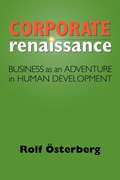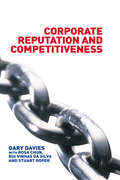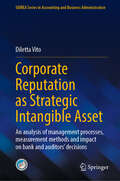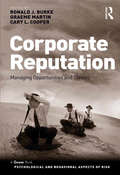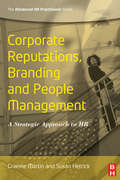- Table View
- List View
Corporate Punishment
by James AdonisThink there's no 'I' in team'? There is. Believe that together everyone achieves more? They don't. Asked to give it 110 per cent? You can't. Think employees are your greatest asset? They ain't. Got an open-door policy? For goodness sake -- shut it!Whether you're a perpetrator or a casualty of cringe-worthy corporate clichés (or both), Corporate Punishment will challenge the way you think about the world of business and the mind-numbing management mottos that have underpinned it for decades. From teams and leadership to workplace culture and customer service, James Adonis smashes to pieces some of the most deeply entrenched business philosophies, offering in their place a progressive new thought process that's light on rhetoric and boring theory, but heavy on practicality and imagination.This book is a protest, a movement, a changing of the management guard -- it is the breath of fresh air every modern business needs and a long overdue break from the hot air that most are forced to endure.
Corporate Purpose and Responsibility
by Lynn Sharp PainePresents several conceptions of corporate purpose and responsibility as articulated by a variety of groups and individuals during the period 1970-95. Included are materials from the Business Roundtable, the American Law Institute, the Royal Society of Arts and Manufacturers (U.K.), the U.S. Catholic Bishops, and excerpts from the writings of economist Milton Friedman and lawyer Christopher Stone. A brief introduction provides historical background on the corporate responsibility debate.
Corporate Purpose – das Erfolgskonzept der Zukunft: Wie sich mit Haltung Gemeinwohl und Profitabilität verbinden lassen
by Annette Bruce Christoph JerominIn diesem Buch erläutern die Autoren, was Corporate Purpose ist und warum er ein Unternehmen von Grund auf verändern wird. Unternehmensentscheider erfahren, wie Corporate Purpose sein Nutzenpotential gleichzeitig im Unternehmen und im Gemeinwohl entfalten kann. Sie erhalten einen Leitfaden und jede Menge Praxiswissen, um auf der Grundlage von Purpose ein tragfähiges Geschäftsmodell mit starken Marken und einem überzeugenden Beitrag zum Gemeinwohl entwickeln und implementieren zu können.Nachwachsende Generationen machen zurzeit überdeutlich: Reine Profitorientierung reicht für die Wettbewerbsfähigkeit eines Unternehmens immer weniger aus. Heute wird von Unternehmen und Marken erwartet, dass sie gesellschaftliche, ökologische und soziale Belange in ihrem Handeln fest verankern und auch für diese Verantwortung übernehmen. Die Mühe lohnt, denn erste Studien zeigen: Unternehmen mit einem klar definierten Purpose wachsen überdurchschnittlich.Aus dem Inhalt Das ist Corporate Purpose und so kann er entwickelt und verankert werden Das kann Corporate Purpose für Unternehmen und Gemeinwohl leistenDrei Handlungsszenarien für die Arbeit mit Corporate Purpose in der PraxisCheckliste zur Einschätzung des Potentials von Corporate Purpose in Ihrem Unternehmen16 Fallbeispiele aus der Praxis vom Start-up über KMU bis zum Global Player So können Sie den Erfolgsbeitrag von Corporate Purpose messenVerantwortungseigentum: eine rechtliche Struktur für purpose-orientierte UnternehmenInterviews zu Praxis-Cases mit: Susanne Franz (Audi), Ulrike Haugen (DNV GL Group), Varena Junge (enyway), Gabriella Ekelund (Essity), Jean-Gabriel Duveau (Gillette), Jan Fischer (Hamburg Towers), Dr. Jens Ade (Hinz&Kunzt), Udo Schulte (Lemonaid), Louise Brierley-Ingham (Patagonia), Markus Essing (Philip Morris International), Karen Löhnert (sleeperoo), Nina Witt (Stop the water while using me), Dr. Antje von Dewitz (VAUDE), Carolin Stüdemann (Viva con Agua) sowie Nataliya Yarmolenko (Weleda) sowie mit dem Team von Mercedes-Benz Cars.Mit einem Gastbeitrag von Achim Hensen (Purpose Stiftung).
Corporate Purpose: Why It Matters More Than Strategy (Routledge Library Editions: The Automobile Industry)
by Shankar BasuOriginally published in 1999 after a decade of research and extensive interviews with some of Toyota's top executives, this book examines organizational purpose: what it is, how it is crafted, how does it relate to strategy and objectives and how does it relate to decisions and actions that ultimately produce organizational results. The author explains why Toyoto Motor Corporation was selected to study corporate purpose and examines the various factors that influence purpose. An overview is given of Toyota in the 1990s and its operating environment, particularly outlining the importance of the Japanes motor industry to Japanese society. Operational objectives of Toyota are analyzed and research findings, data and analysis related to Toyota's purpose are presented and the implications described. In the appendix, the detail of the research methodology of this study is included.
Corporate Real Estate Asset Management: Strategy and Implementation
by Nick Nunnington Barry Haynes Timothy EcclesThe second edition of Corporate Real Estate Asset Management is fully up to date with the latest thought and practice on successful and efficient use of corporate office space. Written from an occupier’s perspective, the book presents a ten-point CREAM model that offers advice on issues such as sustainability, workplace productivity, real estate performance measurement, change management and customer focus. In addition, new case studies provide real-life examples of how corporations in the UK, USA, Hong Kong and Abu Dhabi actively manage their corporate real estate. The book is aimed at advanced undergraduate and graduate students on corporate real estate, facilities management and real estate courses and international MBA programmes.
Corporate Real Estate Asset Management: Strategy and Implementation
by Nick Nunnington Barry P. HaynesIt is important for those studying and practicing in real estate and property management to learn to manage property assets effectively, to be able to provide their companies with effective property and facilities solutions. This book raises the awareness of how real estate management can support business, transform the workplace and impact upon people and productivity, ensuring that costs are minimized and profit maximized. Written for advanced undergraduate students on property related courses, it provides them with a rounded understanding by aligning the subject with estates management, facilities management and business strategy. Case studies and action plans provide real insight and make this book an essential reference for those at the start of their careers in real estate and facilities management.
Corporate Real Estate Management: Schnelleinstieg Für Architekten Und Bauingenieure (essentials)
by Thomas GlatteThomas Glatte provides a comprehensive view on the essentials of corporate real estate management (CREM). The author explains in the influence of corporate strategies on real estate strategies for non-property-companies as well as the importance of corporate real estate portfolios, the set-up of CREM organizations and the handling of respective services. He also elaborates the specifics of corporate social responsibility, sustainability, corporate architecture & design and workplace management.
Corporate Real Estate Management: Schnelleinstieg für Architekten und Bauingenieure (essentials)
by Thomas GlatteThomas Glatte vermittelt in kompakter Form die Grundlagen und ausgewählte Spezifika des Corporate Real Estate Managements. Der Autor erläutert den Einfluss der Unternehmensstrategie auf die Immobilienstrategie von Non-Property-Unternehmen sowie die Bedeutung der betrieblichen Immobilienportfolien, den Aufbau einer CREM-Organisation und den Umgang mit immobilienwirtschaftlichen Dienstleistungen. Zudem erklärt er spezifische Aspekte des CREM wie CSR, Nachhaltigkeit, Corporate Architecture & Design und Workplace Management.Der Autor: Dr.-Ing. Thomas Glatte ist Director Group Real Estate Management bei einem Industriekonzern sowie Lehrbeauftragter an der TU Dresden und der Universität Stuttgart. Er ist Autor zahlreicher Fachpublikationen zu immobilienwirtschaftlichen Themen. Darüber hinaus ist Dr. Glatte Vorstand im CREM-Fachverband CoreNet Global sowie Mitglied des Immobilienbeirats der DGNB.
Corporate Realities: The Dynamics of Large and Small Organisations (Routledge Revivals)
by Robert Goffee Richard ScaseCorporate Realities, first published in 1995, provides a concise but comprehensive review of the management issues relating to different types of organisation. Avoiding academic jargon, it describes the characteristics of administrative, manufacturing, service and professional organisations. It explores the features of both small and large businesses. The authors demonstrate how the transition from small to large scale can be achieved, as well as reviewing recent attempts to recreate entrepreneurial forms of organisation in the context of larger, more complex ones. Most importantly, it identifies future trends and the skills that will be needed to manage corporations at the turn of the century. This book will be of interest to students of business studies.
Corporate Records Handbook, The
by Anthony MancusoKeep your corporation valid in the eyes of the IRS and courts If you've taken the time to turn your business into a corporation, chances are you'd like to see it stay that way. Your business card may say "incorporated," but if the courts and the IRS think differently, it's closing time. Meeting minutes are the primary paper trail of your corporation's legal life, so it's essential to know when and how to prepare these minutes. The Corporate Records Handbook provides all the forms and instructions you need to stay legal, including: . Call of Meeting . Meeting Participant List . Notice of Meeting . Certification of Mailing . Acknowledgment of Receipt of Notice of Meeting . Shareholder Proxy . Meeting Summary Sheet . Minutes of Annual Shareholders' Meeting . Minutes of Special Shareholders' Meeting . Minutes of Annual Directors' Meeting . Minutes of Special Directors' Meeting . Waiver of Notice of Meeting . Approval of Corporate Minutes By Directors of Shareholders . Cover Letter for Approval of Minutes of Paper Meeting . Written Consent to Action Without Meeting The Corporate Records Handbook gives you the forms you need to keep required records, plus more than 75 additional resolutions to insert into your minutes. This edition has been updated to reflect the latest changes in the law. Forms are available to download at nolo.com.
Corporate Records Handbook, The
by Anthony Mancuso AttorneyKeep your corporation valid in the eyes of the IRS and courts If you've taken the time to turn your business into a corporation, chances are you'd like to see it stay that way. Your business card may say "incorporated," but if the courts and the IRS think differently, it's closing time. Meeting minutes are the primary paper trail of your corporation's legal life, so it's essential to know when and how to prepare these minutes. The Corporate Records Handbook provides all the forms and instructions you need to stay legal, including: Call of Meeting Meeting Participant List Notice of Meeting Certification of Mailing Acknowledgment of Receipt of Notice of Meeting Shareholder Proxy Meeting Summary Sheet Minutes of Annual Shareholders' Meeting Minutes of Special Shareholders' Meeting Minutes of Annual Directors' Meeting Minutes of Special Directors' Meeting Waiver of Notice of Meeting Approval of Corporate Minutes By Directors of Shareholders Cover Letter for Approval of Minutes of Paper Meeting Written Consent to Action Without Meeting The Corporate Records Handbook gives you the forms you need to keep required records, plus more than 75 additional resolutions -- both as tear-outs and on CD-ROM Forms Notice and Minutes Forms Meeting Summary Sheet Call of Meeting Meeting Participant List Notice of Meeting Acknowledgment of Receipt of Notice of Meeting Proxy Certification of Mailing Minutes of the Annual Meeting of Shareholders Minutes of Special Meeting of Shareholders Minutes of Annual Meeting of Directors Minutes of Special Meeting of Directors Waiver of Notice of Meeting Approval of Corporate Minutes by Directors or Shareholders Cover Letter for Approval of Minutes of Paper Meeting Written Consent to Action Without Meeting Standard Corporate Business Resolutions Authorization of Treasurer to Open and Use Accounts Authorization of Treasurer to Open and Use Specific Corporate Account(s) Authorization of Corporate Account and Designation of Authorized Signers Authorization of Rental of Safe Deposit Box Adoption of Assumed Name Board Approval of Proposed Contract Approval of Lease Purchase of Real Property Authorization of Sale of Real Property Delegation of Authority to Corporate Employee Director Ratification of Employeeís Acts Board Ratification of Contract Rescission of Authority of Employee Shareholder Ratification of Decisions or Acts Certification of Board or Shareholder Action Affidavit of Corporate Decision Making Acknowledgment Corporate Tax Resolutions S Corporation Tax Election S Corporation Shareholdersí Agreement Accumulation of Corporate Earnings Qualification of Shares Under Internal Revenue Code Section 1244 Approval of Independent Audit of Corporate Financial Records Approval of Corporate Tax Year Payment and Deduction of Organizational Expenses Resolutions to Amend Corporate Articles and Bylaws Approval of Amendment to Articles of Incorporation Approval of Restatement of Articles of Incorporation Amendment of Articles Form Approval of Amendment of Bylaws Corporate Hiring and Appointment Resolutions Approval of Hiring of Corporate Employee Approval of Bonuses and Salary Increases Shareholder Ratification of Employee Pay Approval of Independent Contractor Services Appointment of Corporate Officers Authorization of Payment for Attending Meetings Annual Director or Officer Stipend for Attendance at Meetings No Compensation for Attending Corporate Meetings Indemnification and Insurance for Directors and Officers Director Conflict-of-Interest Resolutions Board Approval of Transaction Benefiting a Director Directorsí Written Consent to Transaction Benefiting a Director Shareholder Approval of Transaction Benefiting a Director Shareholder Written Consent to Transaction Involving a Director Resolutions for Loans to the Corporation Authorization of Loan at Specific Terms Authorization of Maximum Loan on General Terms Unlimited Authorization of Loans for Business Needs Authorization of Line of Credit Authorization of Line of Credit ...
Corporate Records Handbook, The: Meetings, Minutes & Resolutions
by Anthony MancusoKeep your corporation valid in the eyes of the IRS and courts. If you've taken the time to turn your business into a corporation, chances are you'd like to see it stay that way. Your business card may say "incorporated," but if the courts and the IRS think differently, it's closing time. Meeting minutes are the primary paper trail of your corporation's legal life, so it's essential to know when and how to prepare these minutes. The Corporate Records Handbook provides all the forms and instructions you need to stay legal, including: Call of Meeting Meeting Participant List Notice of Meeting Certification of Mailing Acknowledgment of Receipt of Notice of Meeting Shareholder Proxy Meeting Summary Sheet Minutes of Annual Shareholders' Meeting Minutes of Special Shareholders' Meeting Minutes of Annual Directors' Meeting Minutes of Special Directors' Meeting Waiver of Notice of Meeting Approval of Corporate Minutes by Directors of Shareholders Cover Letter for Approval of Minutes of Paper Meeting Written Consent to Action Without Meeting The Corporate Records Handbook gives you the forms you need to keep required records, plus more than 75 additional resolutions to insert into your minutes. This edition has been updated to reflect the latest changes in the law. Forms are available to download at nolo.com.
Corporate Records Handbook, The: Meetings, Minutes & Resolutions
by Anthony MancusoKeep your corporate status—and avoid personal liability Incorporating your business is an important first step in obtaining limited liability status. To keep that status, you must observe a number of legal formalities, including holding and documenting shareholder and director meetings. Meeting minutes form the primary paper trail of a corporation’s legal life—and The Corporate Records Handbook provides all the instructions and forms you need to prepare them. Minutes forms include: • Notice of Meeting • Shareholder Proxy • Minutes of Annual Shareholders’ Meeting • Minutes of Annual Directors’ Meeting • Waiver of Notice of Meeting, and • Written Consent to Action Without Meeting. You’ll also find more than 75 additional resolutions which let you: • elect S corporation tax status • borrow or lend money • adopt pension and profit-sharing plans • authorize bank loans • authorize a corporate line of credit • set up employee benefit plans • purchase or lease a company car • amend articles and bylaws • and more! The Corporate Records Handbook gives you the forms you need to keep required records.. This edition has been updated to reflect the latest changes in the law.
Corporate Reform Elements of the Dodd-Frank Act
by David Lane Robert C. Pozen Phillip AndrewsThis note summarizes the four major changes affecting corporate governance that were made by the Dodd-Frank Act of 2010. These changes relate to: advisory notes by shareholders, refinements to board structure, non-disclosure on compensation and tightening up of certain enforcement provisions.
Corporate Reform in the United States
by Lynn Sharp Paine Kim BettcherThe spate of corporate misdeeds revealed to the American public in 2001 to 2002 prompted corrective action in many quarters of the U.S. economy. The note summarizes some of the steps taken by lawmakers, regulators, law-enforcement officials, companies, investors, professional associations, and educators to restore public trust in U.S. capital markets and the U.S. system of corporate governance.
Corporate Regulation for Climate Change Mitigation in Africa: A Case for Dilute Interventionism (Routledge Research in Sustainability and Business)
by Kikelomo O. KilaThis book critically analyses the prospects of overhauling the legal framework of climate change regulation of corporations in African state. It adopts the dilute interventionism regulatory framework to tackle the culture of regulatory resistance by corporations in Africa. Over the course of this volume, Kikelomo O. Kila critiques the climate change legal framework in all 53 African states and conducts an in-depth case study of the two largest economies in Africa – Nigeria and South Africa – to highlight the commonality of the problems in Africa and the potential for the dilute interventionism paradigm to significantly address these problems. The book establishes why African states should directly intervene through legislative mechanisms to compel corporations to incorporate climate change mitigation in their business activities. It proposes that this direct intervention should comprise a blend of prescriptive and facilitative mechanisms structured in a dilute interventionism regulatory model. Overall, this volume argues that implementing this model requires the institution of a strong and independent regulator with a veto firewall protection system that guarantees its de facto independence from government and external influences. Corporate Regulation for Climate Change Mitigation in Africa will be of great interest to climate change stakeholders at the international, regional, and domestic levels, policymakers, regulatory practitioners, and legal experts on corporate regulation. It will also be an insightful resource for students and scholars of climate change and environmental law, policy, and governance.
Corporate Renaissance: Business as an Adventure in Human Development
by Rolf OsterbergIn this radical book on business and work, Swedish businessman Rolf Osterberg argues that businesses have their priorities all wrong. Paradoxically, corporations also--more than any other institution--have the potential to act as an agent of change toward a human-oriented world. The solution lies in the ongoing fundamental shift in our way of thinking--of our perception of the world, life, the human being, and meaning. This is Osterberg's "new thought." In Corporate Renaissance, Osterberg explores: How the creativity of its employees--not capital--is a company's greatest asset; Why employee-owned companies are the model for the future; Why hierarchies prevent problem-solving; How profit-taking can doom a company; Why setting goals, without an underlying vision, is destructive.
Corporate Reorganisations in China: An Empirical Analysis
by Zinian ZhangThe first comprehensive empirical study on corporate bankruptcy reorganizations in the second largest economy, China, investigating the formal corporate restructurings handled by China's courts between 2007 and 2015. The data and analysis presented in the book provide a unique lens from which China's newly-enacted Chapter 11-styled corporate reorganization law, both in the books and in practice, can be understood and from which the interaction between business and state in dealing with corporate bankruptcies in China could be better comprehended. This book benefits from the author's ten-year business law practice in China, and his insights on China's judicial and political system considerably enrich the arguments. In particular, this book sheds light on commencement of bankruptcy reorganizations, control models, corporate reorganization financing, value distribution, approval of reorganization plans and cross-border reorganizations under the China Enterprise Bankruptcy Law of 2006.
Corporate Reputation Management in den sozialen Medien: Grundprinzipien zur erfolgreichen Einbindung von Social Media (essentials)
by Ralf T. KreutzerDer Aufbau eines Corporate Reputation Managements kann angesichts des enormen Bedeutungsgewinns der sozialen Medien ohne deren umfassende Einbindung nicht mehr gelingen. Dabei ist die Entscheidung über ein Engagement in diesen Medien nicht alleine vom Unternehmen abhängig. Wenn die Interessenten und Kunden oder andere Stakeholder sich in den sozialen Medien über ein Unternehmen unterhalten, dann tun die Unternehmen gut daran, diese Gespräche zumindest mitzuverfolgen und - ggf. sogar deutlich besser - offensiv daran teilzunehmen. Dabei gilt allerdings, dass die sozialen Medien die Machtverteilung zugunsten der Stakeholder verschoben haben und dort i. d. R. ein ,,Dialog auf Augenhöhe" erwartet wird.
Corporate Reputation Management: Wirksame Strategien für den Unternehmenserfolg (Essentials)
by Ralf T. Kreutzer Cornelia WüstDer gute Ruf' eines Unternehmens ist nicht auf das Ergebnis von Image-Kampagnen zu beschränken, sondern bindet auch alle Marken sowie das Unternehmen als Ganzes mit seinen internen und externen Stakeholdern ein. Ausgewiesene Spezialisten diskutieren konkrete Frage- und Infrage-Stellungen zu bestehenden Konzepten und zeigen auf, durch welche Ansätze mit welchen Verantwortlichkeiten (bspw. von Unternehmenskommunikation und Medien) und Strategien nachhaltige Erfolge zu erzielen sind. Namhafte Vertreter aus Industrie, Beratung und Forschung präsentieren Lösungskonzepte.
Corporate Reputation and Competitiveness
by Stuart Roper Rosa Chun Rui Da Silva Gary DaviesThis unique book written by four world leaders in reputation research, presents the latest cutting-edge thinking on organizational improvement. It covers media management, crisis management, the use of logos and other aspects of corporate identity, and argues the case for reputation management as a way of overseeing long-term organizational strategy. It presents a new approach to managing reputation, one that relies on surveying customers and employees on their view of the corporate character and in harmonizing the values of both. This approach has been trialled in a number of organizations and here the authors demonstrate how improving reputation, merely by learning more about what a company is already doing, is worth some five per cent sales growth. The book is a vital, up to date resource for specialists in corporate communication, public relations, marketing, HRM, and business strategy as well as for all senior management. Highly illustrated with over eighty diagrams and tables, it includes up to the minute illustrative case studies and interviews with leading authorities in the field.
Corporate Reputation and the News Media: Agenda-setting within Business News Coverage in Developed, Emerging, and Frontier Markets (Routledge Communication Series)
by Craig E. CarrollThis volume examines agenda-setting theory as it applies to the news media’s influence on corporate reputation. It presents interdisciplinary, international, and empirical investigations examining the relationship between corporate reputation and the news media throughout the world. Providing coverage of more than twenty-five countries, contributors write about their local media and business communities, representing developed, emerging, and frontier markets – including Argentina, Brazil, Chile, China, Germany, Greece, Japan, Nigeria, Spain, and Turkey, among others. The chapters present primary and secondary research on various geo-political issues, the nature of the news media, the practice of public relations, and the role of public relations agencies in each of the various countries. Each chapter is structured to consider two to three hypotheses in the country under discussion, including: the impact of media visibility on organizational prominence, top-of-mind awareness and brand-name recognition the impact of media favorability on the public’s organizational images of these firms how media coverage of specific public issues and news topics relates to the associations people form of specific firms. Contributors contextualize their findings in light of the geopolitical environment of their home countries, the nature of their media systems, and the relationship between business and the news media within their countries’ borders. Incorporating scholarship from a broad range of disciplines, including advertising, strategic management, business, political communication, and sociology, this volume has much to offer scholars and students examining business and the news media.
Corporate Reputation as Strategic Intangible Asset: An analysis of management processes, measurement methods and impact on bank and auditors’ decisions (SIDREA Series in Accounting and Business Administration)
by Diletta VitoThis book offers a comprehensive overview of corporate reputation, aiming to enhance understanding, management processes, and measurement methods associated with this crucial concept. By integrating perspectives from various disciplines such as strategic management, organizational theory, and accounting, the book presents a holistic framework for both enhancing and safeguarding corporate reputation. The book explores essential processes such as creating, acquiring, protecting, and repairing reputational capital, employing a stock and flow model to establish a robust framework for reputation management. Furthermore, the book studies the role of corporate communication and voluntary disclosure in establishing trust and credibility with stakeholders. It provides actionable strategies for reputational risk management and crisis management, emphasizing the critical importance of swift and transparent communication in safeguarding and restoring reputational capital. By addressing stakeholder-specific dynamics and offering detailed guidelines on reputation management, the book underscores the necessity of tailored efforts to meet the unique needs and concerns of diverse stakeholder groups. Designed for scholars, practitioners, business leaders, and students in business and management disciplines, this book aims to deepen their understanding of the strategic importance of corporate reputation.
Corporate Reputation: Managing Opportunities and Threats (Psychological and Behavioural Aspects of Risk)
by Graeme Martin Ronald J. BurkeIncreasing media scrutiny, global coverage and communication via the internet means corporate reputation can be damaged quickly, and failing to successfully address challenges to corporate reputation has consequences. Companies generally suffer almost ten times the financial loss from damaged reputations than from whatever fines may be imposed. According to Ernst & Young, the investment community believes up to 50 per cent of a company's value is intangible - based mostly on corporate reputation. So recognizing potential threats, or anticipating risks, emerges as a critical organizational competence. Organizations can regain lost reputations, but recovery takes a long time. Corporate Reputation contains both academic content along with practical contributions, developed by those serving as consultants or working in organizations in the area of corporate reputation and its management or recovery. It covers: why corporate reputation matters, the increase in reputation loss, threats to corporate reputation, monitoring reputation threats online and offline, the key role of leadership in reputation recovery, and making corporate reputation immune from threats. Any book that is going to do justice to a subject that is so complex and intangible needs imagination, depth and range, and this is exactly what the contributors bring with them.
Corporate Reputations, Branding and People Management
by Graeme Martin Susan HetrickThe book helps HR practitioners understand corporate-level concepts and their relevance to the key strategic agendas of organizations by drawing on a wide range of ideas from branding, marketing, communications, public relations and reputation management. It then examines how effective people management strategies and the role of HR specialist can contribute to this corporate agenda. This contribution lies in four key areas: organizational communications strategies, developing compelling employee value propositions and employer branding; HR strategies, employer of choice policies and talent management; creating new forms of psychological contracts and building stronger individual-organizational linkages through employee identification, employee commitment and psychological ownership; and in developing supportive employee behaviors. The book is based on a new model of the links between HR, corporate reputation and branding, developed from an extensive review and synthesis of different bodies of management literature. This model has been refined from extensive case research and practical experience in building corporate reputations and brands. Specially researched cases include Orange, Aegon, Scottish Enterprise, Hudson International, BSkyB, Standard Life Investments and the Royal Bank of Scotland.














